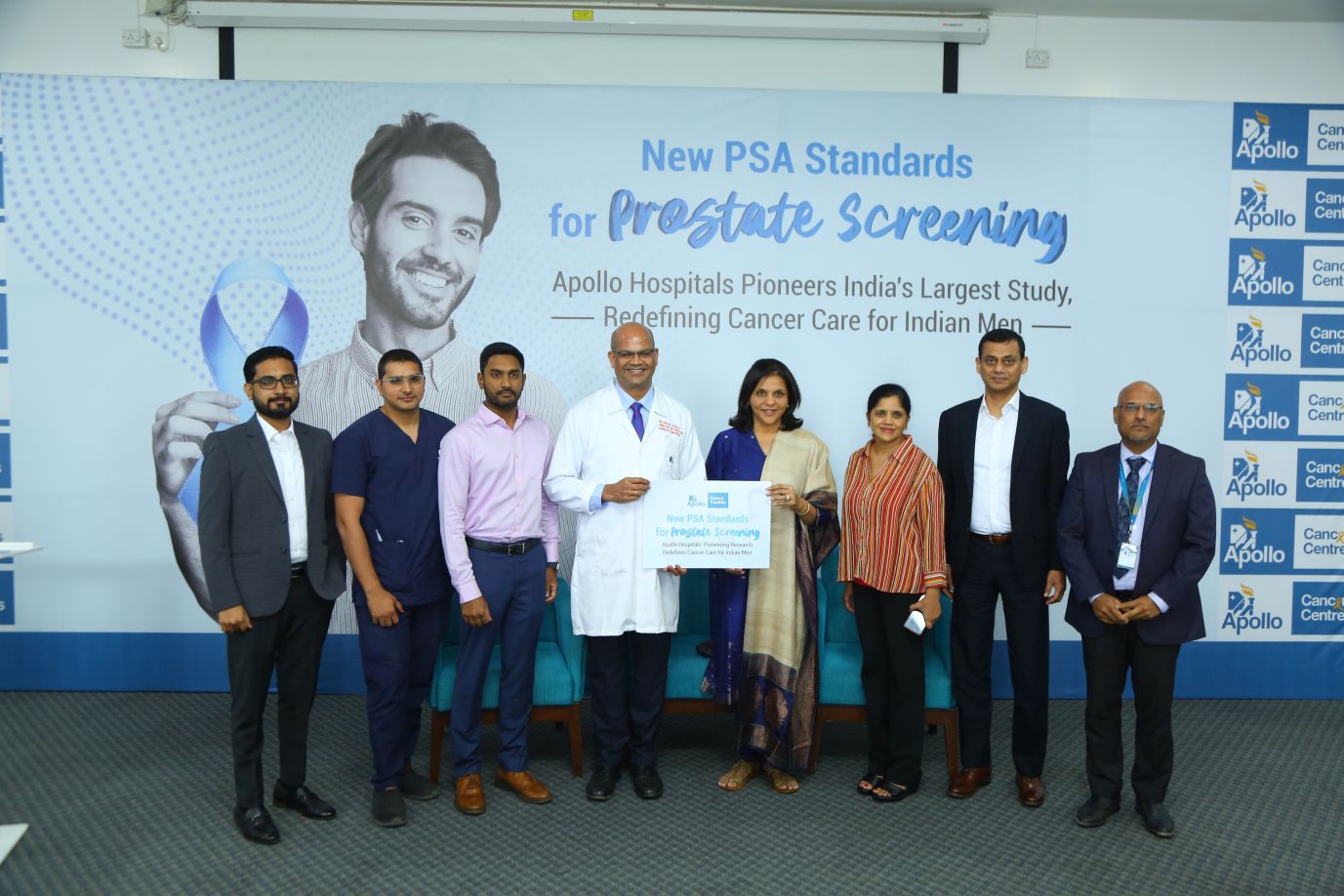- Apollo Hospital's Pioneering Research Redefines Prostate Cancer Screening Standards for Indian Men
- Unveils New Reference Values in the Largest Study of its Kind conducted with close to 1 lakh men with no prior disposition to the disease
In a monumental stride towards advancing prostate cancer care in India, Apollo Hospitals, the world's largest integrated healthcare provider, has unveiled groundbreaking findings in its latest study, 'Determining age‑specific prostate‑specific antigen for healthy Indian men’ published the prestigious Indian Journal of Urology. Led by Dr. N Ragavan and Dr. Sanjai Addla, from Apollo Chennai and Apollo Hyderabad, respectively, the study involved nearly 100,000 healthy men across diverse age groups and regions in Indi a, establishing new reference values for prostate-specific antigen (PSA) specific to the Indian demographic.
PSA is an established blood marker for early diagnosis and monitoring of treatment for prostate cancer. Since 1993, international norms for normal PSA values have been based on a study from the USA and the same have been adopted in India. The western standards quiet often were found to be ill-suited for the Indian population over to diverse genetic demarcations. This latest groundbreaking Apollo study reveals that PSA values in India differ, prompting the establishment of new, tailored standards. Key findings include age-specific PSA standards, a progressive increase in PSA levels with age, and Indian-specific PSA values facilitating earlier detection in younger men.
With this, Apollo hospitals, clinics and diagnostics network will move towards the adoption of these new PSA standards for Prostate Screening.
Dr Sangita Reddy, Joint Managing Director, Apollo Hospitals said, “This landmark study ushers a transformative moment in India’s prostate cancer care landscape, which resonates with our mission to conquer cancer, at every touchpoint possible. Establishing new prostate cancer screening standards for Indian men across ages in a landmark study reflects our commitment to pioneering advancements that redefine cancer care. With divergent PSA standards for different age groups, a progressive increase in levels with age, and Indian-specific values, we are transforming the landscape of prostate cancer care. This monumental shift not only facilitates earlier detection in younger men but also prevents unnecessary investigations in older individuals. By adopting these tailored standards, Apollo Hospitals reaffirms its commitment to patient-centric care and sets the stage for a new paradigm in healthcare innovation.”
Prof Sanjai Addla, Consultant Uro-oncologist, Apollo Hospitals, Jubilee Hills, Hyderabad: “Our study, the largest in India, re-evaluates the age-specific PSA reference ranges tailored for the Indian population. Having data from 1lakh healthy men, we are confident to bridge the gap and enhance the accuracy of serum PSA testing in detecting prostate cancer among Indian men, improving its efficacy as a diagnostic marker and provides hope of treatment for those in the advanced stages also.As the incidence of prostate cancer rises in India, our study sought to address the limited data on age-specific PSA levels in our population. The observed link between serum PSA levels and age among Indian men contrasts with established standards for Caucasian men. This study offers a significant opportunity to redefine age-specific PSA reference ranges for Indian men, enabling more precise clinical decision-making and enhancing our ability to combat prostate cancer effectively.”
Key findings from the Apollo study published in the Indian Journal of Urology of PSA values in 100,000 healthy men who visited Apollo Hospitals (during 2011-2018) for Indian population norms:
- Established divergent PSA standards for different age groups, contrasting with prior global norms.
- Revealed a progressive increase in PSA levels with age: <1.4 ng/mL (<40) to 11.3 ng/mL (>80).
- New Indian-specific PSA values aid earlier prostate cancer detection in younger men with lower PSA levels.
- Prevents unnecessary investigations in older men; new reference range for patients in their 70s and 80s is notably higher.
- Sets the foundation for tailored investigation and treatment in Indian men based on
PSA values.
|
Age |
Old Reference value ng/ml (95th Centile limit) |
New Reference value ng/ml (95th Centile limit) |
|
≤40 years |
NA |
<1.4 |
|
41-50 years |
<2.5 |
<1.7 |
|
51-60 years |
<3.5 |
<3.1 |
|
61-70 years |
<4.5 |
<5.8 |
|
71-80 years |
<6.5 |
<8.82 |
|
>80 years |
NA |
<11.3 |
Committed to patient-centric innovations, Apollo has acquired the latest bk5000 Ultrasound system. This allows us to deliver an integrated state-of-the-art diagnostic for prostate cancer detection, implementing the latest procedure known as Trans-Perineal Real Time Fusion (TP RTF) prostate biopsy. This approach avoids the contaminated transrectal (back passage) route minimizing the need for hospital admissions, bring down the risk of infection and sepsis to almost nil, and ensures a safer and more streamlined biopsy experience for Apollo patients.
